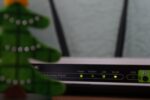In today’s digital age, where we are increasingly hyperconnected, cybersecurity has become a major concern. Our homes are full of Internet-connected devices, from computers and smartphones to home appliances and home automation devices. While this connectivity provides convenience and efficiency, it also poses significant security risks. It is essential to protect our home network and devices against cyber threats. In this article, we’ll explore the importance of cybersecurity in a hyperconnected world and provide tips on how to protect your home network.
Keep your devices updated
Regularly updating operating systems and applications is crucial to ensure the security of your devices. Updates often include security patches that fix known vulnerabilities. Set your devices to update automatically or check regularly for available updates.
Cybersecurity. Use strong passwords
Choose strong, unique passwords for your devices and home networks. Avoid obvious or easy-to-guess passwords. It uses a combination of upper and lower case letters, numbers, and special characters. Also, change the default passwords on devices and routers and never share them with others.
Set up a secure network
Rename your Wi-Fi network and use WPA2 or higher encryption to protect your home network. Avoid using weaker encryption, such as WEP. Additionally, disable the network name (SSID) broadcast feature and enable password authentication to access the router settings.
Use a firewall
Set up a firewall on your router and/or network security device. A firewall helps filter and block unauthorized traffic to and from your home network, thus protecting your devices from outside attacks.
Protect your devices with security software
Use trusted security software, such as antivirus and anti-malware programs, on your devices to protect them against viruses, malware, and other threats. Keep your software up-to-date and perform regular security scans for potential infections.
Cybersecurity. Disable unnecessary functions
Disable any features or services you don’t need on your Internet-connected devices. This reduces potential vulnerabilities and limits unauthorized access.
Use a virtual private network (VPN)
A VPN provides a secure tunnel for your Internet connections, protecting your network traffic from potential interception or surveillance. It’s especially useful when you connect to public or unsecured Wi-Fi networks.
Cybersecurity security education
Stay informed on the latest cybersecurity threats and best security practices. Learn how to identify phishing emails, don’t click on suspicious links, and don’t share sensitive information over unsecured channels. Educate your family about cyber dangers and how to protect themselves.
Consider network segmentation
If you have many devices connected to your home network, consider segmenting it into separate networks. For example, you can have one network for your work devices and another for your entertainment devices. This limits the spread of an attack and protects the privacy and security of your data.
Back up your data
Be sure to regularly back up your important data to an external device or to the cloud. In case of a cyber attack or data loss, you can recover your files without problems.
Conclusions: Cybersecurity
In short, cybersecurity is essential in a hyperconnected world. Protecting your home network and devices against cyber threats is essential to safeguarding your data and privacy. By following the security practices mentioned above, you can strengthen the security of your home network and reduce the risks of potential attacks. Remember that cyber protection is an ongoing effort, so it is important to stay up to date and adapt to the latest threats and security best practices.







